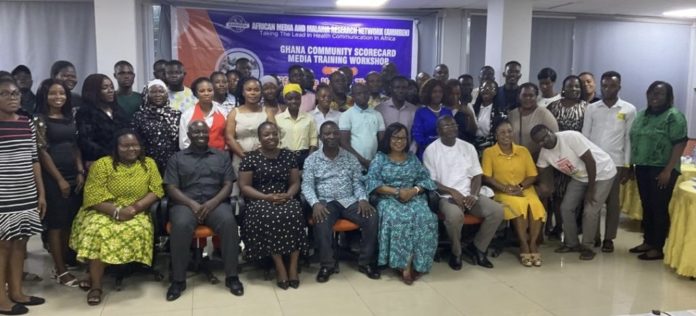In line with Ghana’s commitment to achieving Universal Health Coverage (UHC) by 2030, a two-day training workshop was organised to equip selected journalists with the skills needed to track and report on healthcare delivery at the community level.
The workshop, hosted by the African Media and Malaria Research Network (AMMREN) in collaboration with the Ghana Health Service and the African Leaders Malaria Alliance (ALMA), focused on the Community Scorecard (CSC) initiative.
This initiative is designed to assess and improve health facilities and services within local communities by involving residents in evaluating the quality of healthcare they receive.
Participants at the training were taken through various topics aimed at enhancing their understanding of Ghana’s healthcare system and the specific role of the CSC tool in monitoring healthcare delivery.
Key areas covered included “Ghana’s Primary Healthcare System and Understanding the CHPS (Community-Based Health Planning and Services) Concept,” “The Expertise France Community Scorecard Project,” and “Ghana’s Community Scorecard.”
The journalists were also taught how to access data and information from community scorecard web platforms and advised on media ethics, particularly when reporting on vulnerable groups, such as TB patients, women, and people living with HIV/AIDS (PLWA).
The workshop featured hands-on sessions, allowing journalists to gain practical experience in using the CSC tool to assess healthcare services in their respective communities.
The tool is intended to strengthen accountability by providing communities with a structured way to express their needs and evaluate the performance of local health services.
Dr. Charity Binka, the Executive Director of AMMREN, highlighted the media’s vital role in amplifying community voices and promoting accountability.
She said, “Journalists are crucial in amplifying community voices; hence, this training empowers them to demand accountability and improve healthcare outcomes.”
Dr. Binka expressed appreciation to the Ghana Health Service for its commitment to educating the media, noting that “the UHC target is crucial, and Ghana is not performing too well in its efforts, so journalists need to be empowered with information to foster advocacy, education, and awareness among the populace.”
Dr. Andrew Ayim, Deputy Director in charge of Planning, Monitoring, and Evaluation at the Ghana Health Service, emphasised the media’s responsibility in disseminating balanced health information.
“Although there are concerns with how the media sometimes report on the negatives of the health system, we believe it can get better. Journalists can bridge the gap between the community and the health system by understanding both sides and reporting in a balanced way that helps both to grow together,” Dr. Ayim noted.
He stressed that a collaborative approach between the media and healthcare providers is essential to improving public health, enhancing healthcare access, and moving closer to achieving Ghana’s UHC targets.
Nana Yaw Owusu/Ashanti Region.





